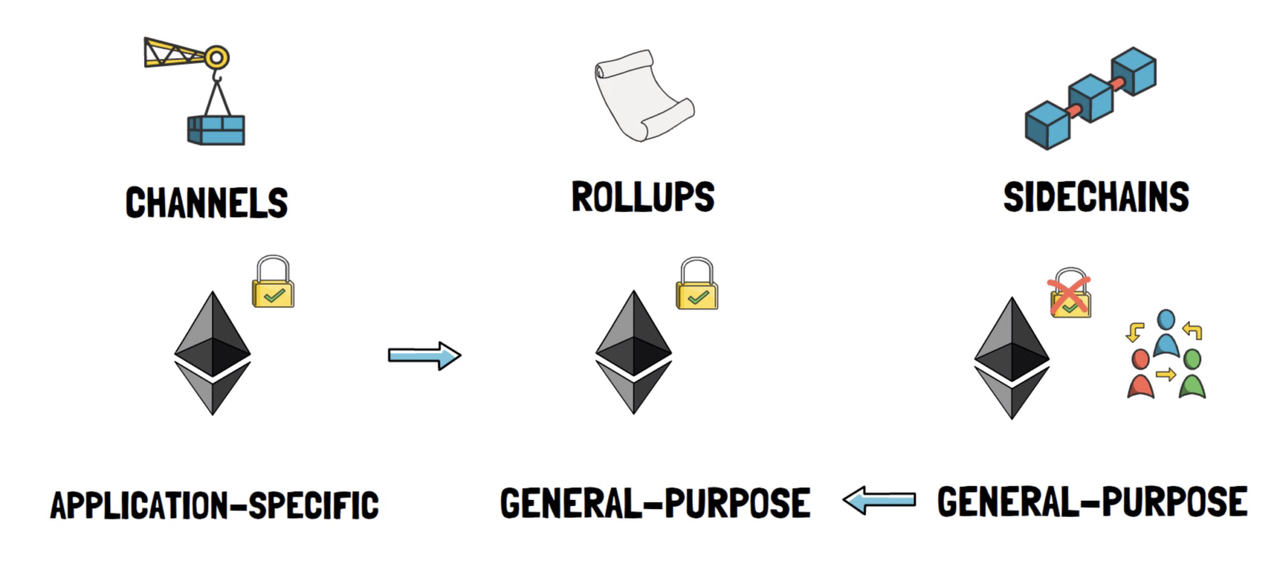Introduction
The increased adoption and usage of Ethereum have consequently led to network congestion and limitations in transaction throughput. Thereby hindering the capacity of the network to effectively scale towards accommodating the growing user base across a wide-array of verticals such as Defi, DAO and Gaming. The Ethereum scalability dilemma remains a complex issue that has garnered enormous research and development efforts. Multiple scaling solutions such as sharding, plasma and rollup-centric scaling approaches have been implemented in a bid to increase transaction speed and throughput without sacrificing security or decentralisation. Thereby, enhancing user adoption and developer innovation on Ethereum.
Overview of Rollups
Overtime, rollups have progressively emerged as one of the most promising approaches towards scaling Ethereum by processing transactions off-chain and batching them onto the mainnet for security. This reduces the load on the mainnet and enables higher transaction throughput while inheriting Ethereum's security via cryptographic proofs. Rollups typically come in two forms which include the optimistic rollups and zk-rollups. Optimistic rollups use fraud proofs to ensure the validity of off-chain transactions, while Zk-rollups adopt zero-knowledge (zk) proofs to provide an additional layer of privacy and security.
Different roll-up designs presently cater to diverse user needs, thereby fostering experimentation, innovation and specialization within the Ethereum ecosystem. Therefore, this article will conduct a comparative analysis of general-purpose and application-specific rollups as solutions to Ethereum's scalability challenges. The key distinctions, trade-offs and impact of each approach will be highlighted.
General Purpose Rollups
General-purpose rollups are designed to enhance the scalability of the Ethereum network by performing transaction execution and computation off-chain while periodically anchoring them on the Ethereum mainnet. They are structurally architected to provide a broad approach to scaling and are suitable for various types of decentralized applications (DApps).
A real-world example of a general-purpose rollup is Arbitrum which utilizes optimistic rollup technology to achieve scalability, allowing for high throughput and low-cost transactions while inheriting security from the Ethereum mainnet through optimistic fraud proofs. Arbitrum's design enables seamless interoperability with Ethereum smart contracts and applications.
General purpose rollups typically support Ethereum Virtual Machine (EVM) compatibility, thereby enabling existing dApps to easily migrate. This flexibility ensures that developers can seamlessly build and deploy various types of versatile applications across different niches, thereby fostering ecosystem growth.
However, the broad architecture of most general-purpose rollups limits optimization for unique and specific use cases. Thereby, fostering the need for application-specific rollups.
Application-Specific Rollups:
Application-specific rollups focus on optimizing scalability for specific types of DApps or use cases by customizing the rollup design and functionality to meet the specific requirements of unique applications unlike in the case of general-purpose rollups. The core benefit of application-specific rollup is that it enhances the customizability of DApps on Ethereum, offering tailored design for specific applications so as to allow unique features and optimisations. This consequently facilitates unmatched scalability as it enables DApps to achieve high throughput and near-instant transactions for specific use cases due to direct peer-to-peer communication.
A practical example of this can be seen in the case of ImmutableX which is an application-specific rollup that provides developers with tailored execution environments specifically designed for gaming on Ethereum. Thereby enabling significant performance improvements and cost efficiency for these unique functions which consequently enhance user experiences.
In the realm of Decentralized Finance (DeFi), scalability and efficiency remain significant challenges. Aevo emerges as a promising solution by acting as an Application-Specific Rollup (ASR), designed to address these limitations and enhance DeFi's overall functionality. Aevo, as an ASR, could facilitate faster and cheaper trading for DeFi exchanges by processing transactions on a separate layer 2. This can significantly improve user experience and attract more traders to the platform.
However, the main trade-off for application-specific rollups is that they are typically not suitable for broader applications beyond their target domain due to the precision in design resulting in limitations in scope. This consequently leads to the issue of limited interoperability due to the difficulty of interacting with other DApps outside the exact application-specific rollup ecosystem. Furthermore, the security mechanisms vary depending on the specific design, requiring careful evaluation. Also, application-specific rollups usually have a steeper learning curve for developers since they require specialized knowledge and tools for the development and deployment of DApps.
Conclusion
It is evident that rollup-centric scaling solutions represent ongoing efforts within the Ethereum community to address the scalability dilemma and ensure the network's continued growth as a global decentralized platform for smart contracts and decentralized applications (DApps). Both general-purpose rollups and application-specific rollups play crucial roles in scaling Ethereum. Therefore, understanding their characteristics, benefits, and trade-offs allows developers and users to make informed decisions. This article underscores that general-purpose rollups offer a balance of flexibility, openness, and versatility, while application-specific rollups provide unmatched scalability for specific use cases that typically would not be feasible using a general-purpose rollup.
Finally, it is promising to note that there are even more exciting Ethereum scaling solutions in the works. One of which is the nil; zkRollup which securely scales Ethereum to over 60,000+ TPS through zkSharding for general purposes, and can also be optimised for application-specific purposes such as privacy-centred games like Chess. Thereby empowering web3 developers to build scalable, secure, and composable applications.
